|
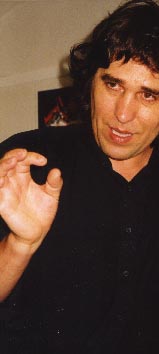 A Question of Quality
A Question of Quality
Painter Teodor Buzu ponders the role of sincerity in art and
the need for communication.
Marius Dragomir & Martina Marečková
We are walking in a tiny little cobblestone street squeezed by old houses leaning over us, just off the historical square, in Tábor, a Czech town in South-Bohemia renowned for having been founded by the famous reformer of Catholicism Jan Hus. We enter an art studio located in a primary art school where Teodor Buzu, a tall, black-haired, 41-year-old Moldovan artist who has exhibited in over 80 settings, including the US, the Netherlands, France, Italy, Austria, Germany, Slovenia and Slovakia, paints and teaches painting.
He opens the door and ushers us in a large room packed with colorful paintings that catch our eye straight away. He pours some red wine in glasses and plays a tape of lively Romanian music. This is his "sanctuary" where one can say pathetic words without feeling ridiculous or risking to be labeled as a silly dreamer.
Here, Buzu is far from the madding crowd and far from his native Moldova, a place where "painters still carry with them a kind of burden—which you can feel in their works, but mostly in their behavior." A sort of humbleness or hopelessness, he suggests, but wouldn't name it. Here, he can think about abstractions, and dream of Romania [The territory currently known as the Republic of Moldova was a part of Romania until 1940, when it was forcibly incorporated into the USSR as a result of the Ribbentrop-Molotov pact of 23 August 1939. It gained independence in 1991 and has chosen not to be reunited with Romania through a plebiscite held in 1994—ed], a place where "painters wake up in the morning and realize that they are free."
Destination: Romania
He couldn't enjoy such a sweet life in Romania or Moldavia today. "I live here because my wife is Czech, and I can't offer her good living conditions in [my native] Bessarabia [region between the Prut and Dniester rivers—ed]," Buzu says. "I came to the Czech Republic because here I have the opportunity to create. However, we begin every autumn thinking about the next summer when we go to Romania."
Buzu met his wife in a train in the early 1980s, when he was still a citizen of the former Soviet Union. He fell in love, dated her for several years, married her later and settled in the former communist Czechoslovakia in 1987, on the day before Christmas. He has carried ever since a nostalgia for Romania, his spiritual homeland, in which he can see more than the stray dogs and dirty beggars immortalized by Western newspapers.
Some of his Czech friends are also visiting Romania regularly. Two of them, artists Radomír Postl and Matouš Vondrák, joined Buzu on his last trip to Romania in July and contributed to an exhibition organized in Bucharest, in the building of the National Theater, by the Department of Art Exhibitions of the Romanian Ministry of Culture.
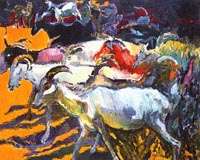
Postl exhibited posters and black and white photos, while Vondrák, a teacher with the Faculty of Arts at the University in [the Czech town] České Budějovice, submitted 30 watercolors of Romanian peasants families inspired by some 100-year-old photos from the Museum of the Romanian Peasant in Bucharest. Later on, they traveled to Eastern Romania where took part in a creation camp in Slanic Moldova.
The country of his dreams
"My Czech friends liked first of all the way people communicate [in Romania]," Buzu says. "For a painter, communication is very important. We express in images what we can't express in words. Painters are doing what they are doing guided by a thirst for communication, and in Romania you can find what you can't find in the West. You can talk to a peasant, to a shepherd, you can have lunch in their houses, they are very hospitable. You feel like a human being there."
"We also noticed in Romania that the religious sentiment is more intense. Lots of people, not only old ones, but also teenagers, stop and make the sign of the cross when passing by a church. Even the man who drove us [around] used to stop the car to do this."
"I'd also make a comparison between Italy and Romania—I've been to both with my Czech friends. They told me that they liked Romania more than Italy, and I agree. Italy is full of kitsch. I 'm not saying that all galleries [are], but almost all are full of kitsch. It's strange, and this staggered us. In Romania, even commercial exhibitions have that element of professionalism."
And it is not only people that catch the artists eye in Romania, Buzu says. Many of his paintings are inspired by the Romanian landscape, its mountains and monasteries.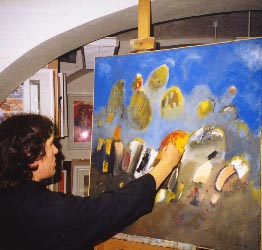 "One can feel in Romania and Moldova a more intense relationship with nature," Buzu says."You can find it everywhere there, but hardly here [in the Czech Republic] where places have lost their soul, have become touristy. Maybe we can count here Šumava [a Czech National Park], which is kind of a spiritual place." "One can feel in Romania and Moldova a more intense relationship with nature," Buzu says."You can find it everywhere there, but hardly here [in the Czech Republic] where places have lost their soul, have become touristy. Maybe we can count here Šumava [a Czech National Park], which is kind of a spiritual place."
Talking about art in Romania and in the Czech Republic, Buzu says that Romanian painters are more open. "They look towards Paris, while in the Czech Republic the French influence is zero," he says. "I can even say that, from this point of view, Czechs are isolated. You don't know here what's happening in Slovakia, Poland, Slovenia, Croatia, Russia and Ukraine, although they all boast a Slavic structure and tradition."
At war with postmodernism and the critics
Buzu seems to be a painter born too late, uncomfortable with the postmodernist "happening" or advertising which claims the status of art. "I am interested in what can't be expressed by words," Buzu says. "If the author is sincere and pours his soul into painting, the visitor will come back. Every kind of art has the right to live. When a painter paints and thinks, he reaches certain abstract levels and not everyone can bear these levels. That's why so many painters drink a lot.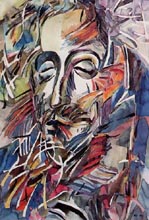 They become aggressive with time, they go against the rhythm of society. When a person wakes up, he goes to work and [then] comes back home, but a poet, an artist wakes up and he does what nobody needs." They become aggressive with time, they go against the rhythm of society. When a person wakes up, he goes to work and [then] comes back home, but a poet, an artist wakes up and he does what nobody needs."
Both happening and advertising, Buzu argues, are just art accessories. "Advertising is mostly aggression, and aggression itself is today part of people's lives," he says. "One comes home from work, is tired and likes to look at pictures which mean something to him. And finds advertising, which is destroying him because it's aggressive and is continuously attacking people."
The "happening" [has the right to live, but remains a simple art accessory, Buzu says. A matter of fashion dictated by a bunch of art "experts" who rule art's roost. "Now it [this postmodern form] is fashionable and it's said to be real art but I think it's a mistake," Buzu says. "But the main problem now is with [art] critics. They don't get the basics. A painter paints and an art critic comes and praises him. He [the critic] writes a story and then everyone [is expected to] paint as he says. That's wrong."
"I don't need to listen to critics and I don't paint as they say. I go to exhibitions, though, to gain confidence. For me, it's important to compare [my work with that of other artists] and know if I'd like to paint like that painter. It's not a problem to copy what others paint. The problem for me is to believe that it is right to paint the way he does."

|
Buzu, who is not aware of any influence upon himself and thinks it's a mistake to try to put an artist in a box or on a shelf, has already experienced the opinionated remarks of omniscient critics who change their taste as the wind blows. "When I came to the Czech Republic, people used to criticize my paintings, saying that they were too colorful and exotic," Buzu says. "But the same people and critics praise me now. I used to have a notebook at the exhibition and people would write there 'thank you for the aesthetic experience' and such bullshit. Now, I don't put any notebook there. It's useless. Anyway, the fact somebody criticizes my art doesn't mean that I would change my style just to please them or gain success."
Not for the masses
He has already built a close group of impassioned fans around him whose visits to his exhibitions have became a sort of ritual. That's why Buzu aims to exhibit at least once a year in Tábor. Such exhibitions help him look at himself through the visitor's eyes.
"It's like a laboratory," he says. "A painting belongs in an exhibition, it lives only when a visitor can see it. Some critics may praise me in the newspapers but I don't take it seriously. On the other hand, there are some people[...] who don't understand art but can feel; and that's important. It's enough for me that they say a sentence or two and I know what they are talking about."
Exhibitions can be also turned into a market, we suggest. It's a topic grating up Buzu's nerves. "Because everything costs, I try not to think about it, 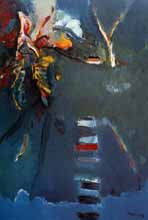 because otherwise the commercial element would be recognizable in my paintings," Buzu says. "It's enough to stay sincere and touch the senses of some of the audience. They will buy a painting if they like it. Moreover, when someone buys my painting, I know that he'll come back and want another one." because otherwise the commercial element would be recognizable in my paintings," Buzu says. "It's enough to stay sincere and touch the senses of some of the audience. They will buy a painting if they like it. Moreover, when someone buys my painting, I know that he'll come back and want another one."
It doesn't need to be in a month, it can be in a year, it's not a question of turning painting into trade, Buzu explains. "Ultimately, I paint for a certain group of people and it's interesting [for me to try and] educate that group," he says. "A great painter said that a painter paints what he sells and an artist sells what he paints, which is a great truth. I don't want to pander to the masses, to make commerce."
"One of my acquaintances, a sculptor, says that a painter's fate is similar to a prostitute's fate. I don't agree. Here [in painting] it's a question of quality. You have to know how to play this role, the painter's role. I think I don't need to pander to people, tickle their vanity." That's why Buzu shrinks from making compromises with some "clients" who order paintings. "If someone comes and wants me to paint something that doesn't suit me, I wouldn't do it," he says. "I simply paint what I want."
Can you make a living this way? It's our final question for Buzu who, apart from painting, teaches two days a week at the Art School in Tábor. "One does not become rich doing this but one won't die of hunger either," he says.
Marius Dragomir & Martina Marečková,
3 December 2001
Moving on:
|
Vol 3, No 31
3 December 2001
|
|





 "One can feel in Romania and Moldova a more intense relationship with nature," Buzu says."You can find it everywhere there, but hardly here [in the Czech Republic] where places have lost their soul, have become touristy. Maybe we can count here Šumava [a Czech National Park], which is kind of a spiritual place."
"One can feel in Romania and Moldova a more intense relationship with nature," Buzu says."You can find it everywhere there, but hardly here [in the Czech Republic] where places have lost their soul, have become touristy. Maybe we can count here Šumava [a Czech National Park], which is kind of a spiritual place." They become aggressive with time, they go against the rhythm of society. When a person wakes up, he goes to work and [then] comes back home, but a poet, an artist wakes up and he does what nobody needs."
They become aggressive with time, they go against the rhythm of society. When a person wakes up, he goes to work and [then] comes back home, but a poet, an artist wakes up and he does what nobody needs."
 because otherwise the commercial element would be recognizable in my paintings," Buzu says. "It's enough to stay sincere and touch the senses of some of the audience. They will buy a painting if they like it. Moreover, when someone buys my painting, I know that he'll come back and want another one."
because otherwise the commercial element would be recognizable in my paintings," Buzu says. "It's enough to stay sincere and touch the senses of some of the audience. They will buy a painting if they like it. Moreover, when someone buys my painting, I know that he'll come back and want another one."